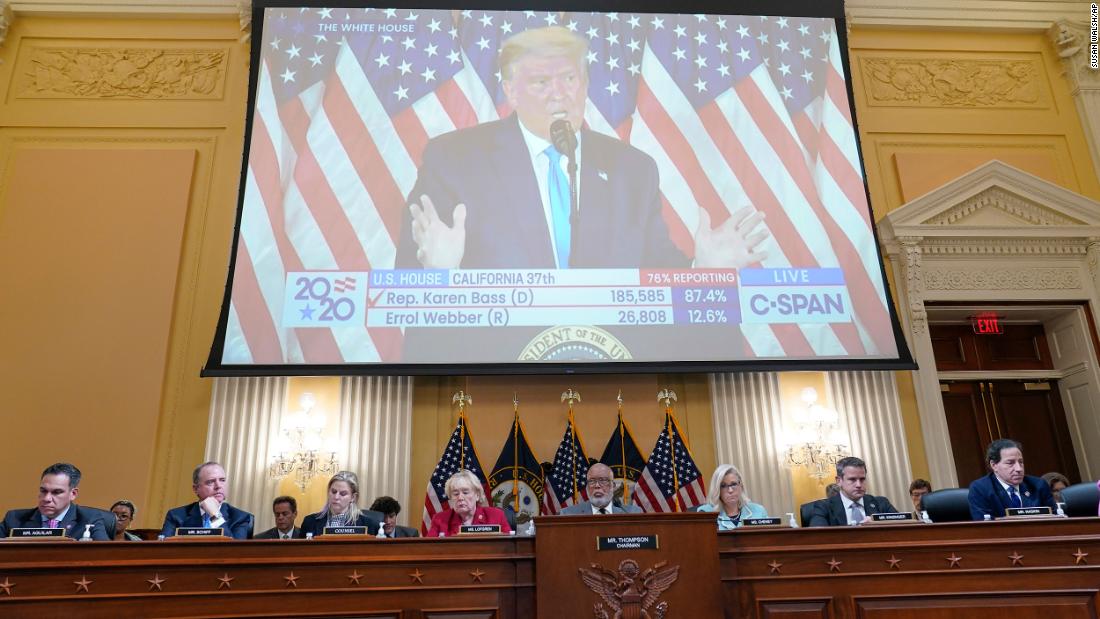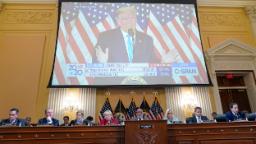

If the purpose of the inquiry is to create a series of indisputable facts — that Trump knew, or should have known, he had lost the election and that the allegations of fraud were ridiculous — this hearing convincingly started to fill in the gaps, leaning heavily on the prior testimony of former Attorney General Bill Barr, who used blunt language to dismiss Trump’s lies.
His inner circle knew. Top officials from Trump’s campaign and his White House said they had told the former President he lost the election and that it wasn’t stolen from him.
Trump turned to an ‘apparently inebriated’ Giuliani
The committee aired a deposition clip of Trump spokesman Jason Miller similarly describing Giuliani as “definitely intoxicated” on election night.
The descriptions of election night — when Trump declared the whole election a fraud that had been stolen from him — are a key element of the committee’s presentation.
Trump’s campaign manager was sidelined
Bill Stepien, who ran Trump’s campaign, did not show up for in-person testimony after his wife went into labor Monday morning. Committee members instead played portions of his earlier private deposition.
Stepien’s testimony was dispassionate and direct and described how he had tried to shield Trump from Giuliani’s ideas on election night and later how he had been sidelined by Trump for not buying into the election lie.
Stepien said he had told Trump to avoid making a pronouncement on election night and to wait for votes to be counted in key close states. Instead, Trump took Giuliani’s advice and said he had won the election and that the results were a fraud.
Stepien later said that what had led him to leave the campaign after the election was his feeling that what was happening was not “honest or professional.”
Barr noted in video of his deposition that the committee aired on Monday that Trump had made these fraud allegations “before there was actually any potential of looking at evidence.”
In fact, as we know from Trump’s public statements, he had been priming to question the results for weeks or months.
Where is Stepien now?
Authorities chased down fraud allegations
The committee played lengthy video excerpts from Barr, who talked in his private depositions about being asked by Trump to look at fraud claims.
Video of Barr, along with live testimony from a former US attorney in Georgia and a former Philadelphia city commissioner, went allegation by allegation through baseless claims of fraud made by Giuliani and Trump in the weeks after Election Day.
Exactly zero of the conspiracy theories have been proved — and there are logical explanations for what actually happened.
- There was no evidence of fraud in Philadelphia. “Absolute rubbish,” Barr said.
- There was no evidence of a big vote dump in Detroit. Barr said Trump actually did better there in 2020 than in 2016.
- The concerns of a truck driver that he had delivered fraudulent ballots were investigated and dismissed.
- Misleading video shared online from Georgia was not of a suitcase of fraudulent ballots, but rather the normally used lockbox.
- Dominion voting machines were not fraudulent. Barr said “idiotic claims” had been made in a sensational way to influence people. Read more.
Telling the truth led to threats against officials and their families
“After the President tweeted at me by name, calling me out the way that he did, the threats became much more specific, much more graphic. And included not just me by name but included members of my family by name, their ages, our address, pictures of our home.”
Barr worried Trump was ‘detached from reality’
“I was somewhat demoralized, because I thought, ‘Boy, if he really believes this stuff, he has lost contact with — he’s become detached from reality if he really believes this stuff,’ ” Barr said in one snippet.
Trump’s post-election fundraising questioned as a shakedown
As he was publicly attacking the election his campaign knew he had lost, Trump raised money with up to 25 fundraising emails each day, according to committee member Rep. Zoe Lofgren, a California Democrat.
Most of the money went to Trump’s Save America PAC. It spent millions on a rally near the White House on January 6 and sent money to Trump’s political allies, including then-White House chief of staff Mark Meadows.
“The ‘big lie’ was also a big ripoff,” Lofgren summarized.
Caveats
The most important parts of the public hearings so far have come from recorded testimony — from Barr, Stepien and Miller.
It’s a one-sided affair
The nature of the hearing, without Trump supporters to cross-examine, was very one-sided.
Republican leaders aside from Cheney and Rep. Adam Kinzinger of Illinois refused to take part in the committee. Later, House Speaker Nancy Pelosi rejected their plan to put Trump loyalists like Reps. Jim Jordan of Ohio and Jim Banks of Indiana, who voted against certifying the 2020 election results, on the panel.
As a result, there is no one at these hearings defending Trump.
What’s coming?
We have an idea. Here’s what Cheney said during last week’s prime-time hearing will be covered in the remaining hearings:
- Trying to use the government to spread his lie. The third public hearing, to be held Wednesday, will show how “Trump corruptly planned to replace the Attorney General of the United States so the US Justice Department would spread his false stolen election claims.”
- Pressuring Pence to reject electoral votes. The fourth public hearing, to be held Thursday, will illustrate “Trump’s efforts to pressure Vice President Mike Pence to refuse to count electoral votes on January 6th.”
- Pressuring state legislators. The fifth hearing will provide “evidence that President Trump corruptly pressured state legislators and election officials to change election results.”
- Inciting insurrection. The final two June hearings will show how “Trump summoned a violent mob and directed them, illegally, to march on the US Capitol” and “failed to take immediate action to stop the violence and instruct his supporters to leave the Capitol.”
